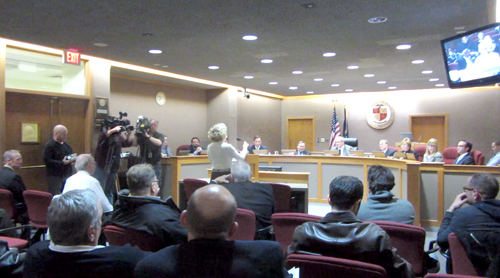
Royal Oak resident Lindsay Hoffman addresses the Royal Oak City Commission Nov. 19. The city voted 7-0 to move forward with having the city attorney report back on broadening the human rights ordinance to welcome LGBT people. BTL photo: Crystal Proxmire
With a unanimous 7-0 vote, the Royal Oak City Commission voted Monday, to have their city attorney draft "the most broad human rights ordinance," to be voted on at a later meeting.
Commissioners Jim Rasor and Kyle DuBuc presented the proposal to the Commission and over an hour's worth of commentary was heard on the subject. One resident complained that a new law is not needed, especially if discrimination is not a problem in Royal Oak and another said that the law should protect everyone so there is not "reverse discrimination."
But other than those two concerns, the crowd overwhelmingly supported the idea. Tyler Marka, holding an infant in her arms said, "I'm surprised it hasn't been approved here before. A lot of friends move here because this is a progressive town, equal rights are not special rights. From this past election it's evident this is the way most Americans feel. Royal Oak is a great city and we should make sure we're on the right side of history on this."
Marka also pointed out, "Some people may come up here and suggest that this is something that should be put to a popular vote, but I believe people's civil liberties should never be put to a popular vote," and that "the people of Royal Oak are good people, but you can't rely on people to always do the right thing, otherwise we wouldn't need laws."
Several business owners came out to support moving forward on an ordinance. Michael Chetcuti and Kyle Evans, owners of 711 on Main Street and Royal Oak residents, said they support it. John Dempster, owner of Mr. B's said, "As a diverse business employer I support this 100 percent. Tom Valente, owner of Holiday Market, has over 300 employees. He urged the city to embrace all people.
David Wollack, a former assistant prosecuting attorney, explained that there is "a void in our laws," and that passing an ordinance would give police more tools to react if there is an instance of discrimination. Currently in Michigan a person can still be fired because they are gay. A person can be denied housing or refused service if they are gay. And if someone is targeted for a crime because they are gay, there are no motive-based consequences as there are with victims of hate crimes based on race, gender, age, disability or religion.
Ferndale Mayor Dave Coulter also spoke at public comment, addressing concerns about potential lawsuits or more resources being taken up by police enforcement. Since Ferndale passed their ordinance ten years ago, there have been zero instances of discrimination Coulter said. Ferndale is one of 21 cities across Michigan that have some form of an LGBT inclusive human rights ordinance in place including Mt. Pleasant, Ann Arbor, Flint, Detroit, Traverse City and Saginaw. Coulter explained that the ordinance serves as a welcome mat for new businesses and residents.
Commissioner Mike Fournier explained his 'yes' vote.
"Somebody in public comment asked 'Where are the Christians,' so maybe I can give some perspective as it relates to that. For the most part I keep my faith private and quiet, but as some of you are aware I am openly Catholic and I make no apologies for my beliefs," Fournier said.
"I feel privileged to live in a country where I can practice my faith without persecution, without discrimination, and without interference. That I can take pride in who I am and the things I accomplished. I'm not qualified to speak on behalf of all Christians. I'm probably considered a sinner in most cases, but I believe in embracing the values of love, tolerance and the acceptance of others as paramount to peace and advancing the human condition. If only embraced unconditionally, unqualified and without equivocation… As a father it pains me to think the possibility of my daughters or my son being denied justice or equality through no fault of their own simply because of who they are. How would I comfort them? What words would suffice? What action could I take? And now confronted with taking action – and yes, taking no action is an action as well – what should I do, cave to some social pressures or rely upon the values I believe in and lift up all? …. I will side with love, tolerance and acceptance and support this human rights ordinance. Tonight I will go home quietly, enter my children's' rooms, kiss them on their forehead and know that their dad did the right thing tonight."
Jerry, a 71-year-old resident felt compelled to come to the meeting and stand up. "I'm walking down Knowles and it's dark and I'm thinking 'wow am I lucky. Nobody bothers me. I'm fine. I'm safe. And I've been thinking, you know, when I think back a couple years ago about the gay fellow who got beat to death because he was gay. I think like you know people say why should we change anything? It's because it gives the police more power and it shows we're not going to fool around with any brutality."
The vote does not enact an ordinance; it simply directs the city attorney to draft one. Rasor provided council and counsel with same ordinances from other cities, and said that Ann Arbor's is the model he would prefer. Once the attorney has drafted an ordinance, it will come again before the commission for a vote.










